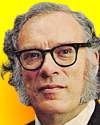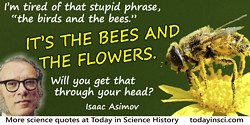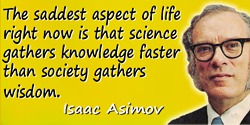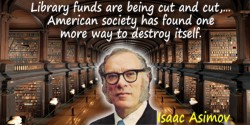 (source)
(source)
|
Isaac Asimov
(2 Jan 1920 - 6 Apr 1992)
Russian-American writer and biochemist who was a prolific author and editor of science fiction and non-fiction.
|
Isaac Asimov Quotes on Belief (16 quotes)
>> Click for 265 Science Quotes by Isaac Asimov
>> Click for Isaac Asimov Quotes on | Biography | Creationist | Death | Fear | Ignorance | Knowledge | Life | Science | Scientist | Solution | Theory | Understanding | Universe |
>> Click for 265 Science Quotes by Isaac Asimov
>> Click for Isaac Asimov Quotes on | Biography | Creationist | Death | Fear | Ignorance | Knowledge | Life | Science | Scientist | Solution | Theory | Understanding | Universe |
A number of years ago, when I was a freshly-appointed instructor, I met, for the first time, a certain eminent historian of science. At the time I could only regard him with tolerant condescension.
I was sorry of the man who, it seemed to me, was forced to hover about the edges of science. He was compelled to shiver endlessly in the outskirts, getting only feeble warmth from the distant sun of science- in-progress; while I, just beginning my research, was bathed in the heady liquid heat up at the very center of the glow.
In a lifetime of being wrong at many a point, I was never more wrong. It was I, not he, who was wandering in the periphery. It was he, not I, who lived in the blaze.
I had fallen victim to the fallacy of the “growing edge;” the belief that only the very frontier of scientific advance counted; that everything that had been left behind by that advance was faded and dead.
But is that true? Because a tree in spring buds and comes greenly into leaf, are those leaves therefore the tree? If the newborn twigs and their leaves were all that existed, they would form a vague halo of green suspended in mid-air, but surely that is not the tree. The leaves, by themselves, are no more than trivial fluttering decoration. It is the trunk and limbs that give the tree its grandeur and the leaves themselves their meaning.
There is not a discovery in science, however revolutionary, however sparkling with insight, that does not arise out of what went before. “If I have seen further than other men,” said Isaac Newton, “it is because I have stood on the shoulders of giants.”
I was sorry of the man who, it seemed to me, was forced to hover about the edges of science. He was compelled to shiver endlessly in the outskirts, getting only feeble warmth from the distant sun of science- in-progress; while I, just beginning my research, was bathed in the heady liquid heat up at the very center of the glow.
In a lifetime of being wrong at many a point, I was never more wrong. It was I, not he, who was wandering in the periphery. It was he, not I, who lived in the blaze.
I had fallen victim to the fallacy of the “growing edge;” the belief that only the very frontier of scientific advance counted; that everything that had been left behind by that advance was faded and dead.
But is that true? Because a tree in spring buds and comes greenly into leaf, are those leaves therefore the tree? If the newborn twigs and their leaves were all that existed, they would form a vague halo of green suspended in mid-air, but surely that is not the tree. The leaves, by themselves, are no more than trivial fluttering decoration. It is the trunk and limbs that give the tree its grandeur and the leaves themselves their meaning.
There is not a discovery in science, however revolutionary, however sparkling with insight, that does not arise out of what went before. “If I have seen further than other men,” said Isaac Newton, “it is because I have stood on the shoulders of giants.”
— Isaac Asimov
Adding A Dimension: Seventeen Essays on the History of Science (1964), Introduction.
And above all things, never think that you’re not good enough yourself. A man should never think that. My belief is that in life people will take you at your own reckoning.
— Isaac Asimov
…...
I believe in evidence. I believe in observation, measurement, and reasoning, confirmed by independent observers. I’ll believe anything, no matter how wild and ridiculous, if there is evidence for it. The wilder and more ridiculous something is, however, the firmer and more solid the evidence will have to be.
— Isaac Asimov
After stating he did definitely not believe in flying saucers, ancient astronauts, Bermuda Triangle or life after death, he explained what he would believe in. From editorial, 'Don’t You Believe?', Isaac Asimov's Science Fiction Magazine (18 Jan 1982), 6, No. 1, 6.
Collected in The Roving Mind (1983), 43.
I believe that only scientists can understand the universe. It is not so much that I have confidence in scientists being right, but that I have so much in nonscientists being wrong.
— Isaac Asimov
Webmaster has not yet been able to confirm this attribution. If you know an original print citation, please contact Webmaster.
I don't believe in an afterlife, so I don't have to spend my whole life fearing hell, or fearing heaven even more. For whatever the tortures of hell, I think the boredom of heaven would be even worse.
— Isaac Asimov
In Rosemarie Jarski, Words from the Wise (2007), 18.
I’m sure that science can’t ever explain everything and I can give you the reasons for that decision … I believe that scientific knowledge has fractal properties; that no matter how much we learn, whatever is left, however small it may seem, is just as infinitely complex as the whole was to start with. That, I think is the secret of the universe.
— Isaac Asimov
In It’s Been a Good Life (2009), 258, cited as from I. Asimov: A Memoir (1994), 481.
If I were not an atheist, I would believe in a God who would choose to save people on the basis of the totality of their lives and not the pattern of their words. I think he would prefer an honest and righteous atheist to a TV preacher whose every word is
— Isaac Asimov
…...
Imagine the people who believe such things and who are not ashamed to ignore, totally, all the patient findings of thinking minds through all the centuries since the Bible was written. And it is these ignorant people, the most uneducated, the most unimaginative, the most unthinking among us, who would make themselves the guides and leaders of us all; who would force their feeble and childish beliefs on us; who would invade our schools and libraries and homes. I personally resent it bitterly.
— Isaac Asimov
In The Roving Mind (1983), 26.
It is a great deal easier to believe in the existence of parapsychological phenomena, if one is ignorant of, or indifferent to, the nature of scientific evidence.
— Isaac Asimov
Epigraph in Isaac Asimov’s Book of Science and Nature Quotations (1988), 207.
It is tempting to wonder if our present universe, large as it is and complex though it seems, might not be merely the result of a very slight random increase in order over a very small portion of an unbelievably colossal universe which is virtually entirely in heat-death. Perhaps we are merely sliding down a gentle ripple that has been set up, accidently and very temporarily, in a quiet pond, and it is only the limitation of our own infinitesimal range of viewpoint in space and time that makes it seem to ourselves that we are hurtling down a cosmic waterfall of increasing entropy, a waterfall of colossal size and duration.
— Isaac Asimov
(1976). In Isaac Asimov’s Book of Science and Nature Quotations (1988), 331.
People are entirely too disbelieving of coincidence. They are far too ready to dismiss it and to build arcane structures of extremely rickety substance in order to avoid it. I, on the other hand, see coincidence everywhere as an inevitable consequence of the laws of probability, according to which having no unusual coincidence is far more unusual than any coincidence could possibly be.
— Isaac Asimov
In The Planet That Wasn't (1976), 3.
Science is dangerous. There is no question but that poison gas, genetic engineering, and nuclear weapons and power stations are terrifying. It may be that civilization is falling apart and the world we know is coming to an end. In that case, why no turn to religion and look forward to the Day of Judgment, ... [being] lifted into eternal bliss ... [and] watching the scoffers and disbelievers writhe forever in torment.
— Isaac Asimov
The 'Threat' of Creationism. In Ashley Montagu (ed.), Science and Creationism (1984), 192.
Self-education is, I firmly believe, the only kind of education there is.
— Isaac Asimov
In Science Past, Science Future (1975), 208.
The law of conservation of energy tells us we can't get something for nothing, but we refuse to believe it.
— Isaac Asimov
In Isaac Asimov's Book of Science and Nature Quotations (1988), 75.
The wish to believe, even against evidence, fuels all the pseudosciences from astrology to creationism.
— Isaac Asimov
There is no belief, however foolish, that will not gather its faithful adherents who will defend it to the death.
— Isaac Asimov
In The Stars in Their Courses? (1971), 36.
See also:
- 2 Jan - short biography, births, deaths and events on date of Asimov's birth.
- Isaac Asimov - context of quote “It’s the bees and the flowers.” - Medium image (500 x 250 px)
- Isaac Asimov - context of quote “It’s the bees and the flowers.” - Large image (800 x 400 px)
- Asimov's Chronology of Science and Discovery, by Isaac Asimov. - book suggestion.
- Booklist for Isaac Asimov.



 In science it often happens that scientists say, 'You know that's a really good argument; my position is mistaken,' and then they would actually change their minds and you never hear that old view from them again. They really do it. It doesn't happen as often as it should, because scientists are human and change is sometimes painful. But it happens every day. I cannot recall the last time something like that happened in politics or religion.
(1987) --
In science it often happens that scientists say, 'You know that's a really good argument; my position is mistaken,' and then they would actually change their minds and you never hear that old view from them again. They really do it. It doesn't happen as often as it should, because scientists are human and change is sometimes painful. But it happens every day. I cannot recall the last time something like that happened in politics or religion.
(1987) -- 


